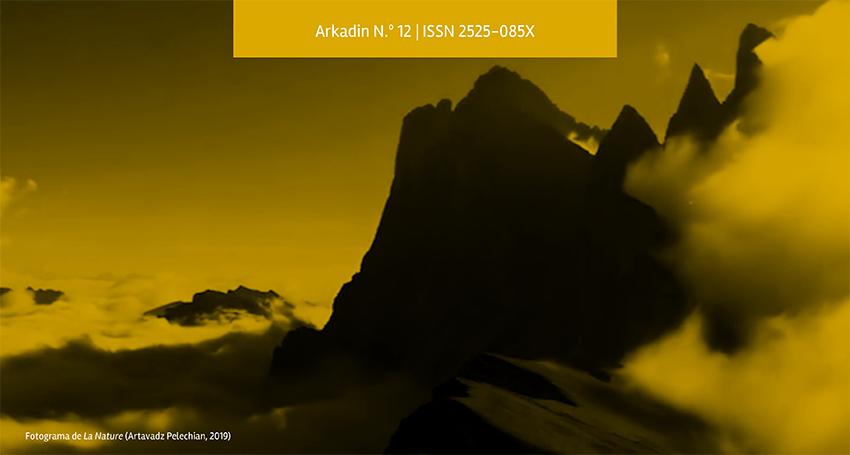Expanded Cinema
DOI:
https://doi.org/10.24215/2525085Xe048Keywords:
Device, Cinema, Expanded Cinema, Projection, ScreenAbstract
Starting from a plural conception of the notion of device, simultaneously referring to the expressive forms, the spectator and a regime of beliefs that is always circumstantial, what is decisive in this approach are the possibilities of reinvention, reconfigurations and expansions of the devices. In this case, the experiments that encompass a set of manifestations that we call expanded cinema are reviewed.References
Duguet, A.M. (2002). Déjouer l’image. Créations électroniques et numeriques. Éditions Jacqueline Chambon.
Duguet, A.M. (1997). Jeffrey Shaw: from expanded cinema to virtual reality. (Catálogo de exposción). ZKM.
Dye, D. (Director). (1975). Overlap. [Película].
Emshwiller, E. (Director). (1965). Body Works. [Performance multimedia].
Fried, M. (1969). Manet’s Sources. En revista Artforum Vol 7. N°7. New York. From the archives: Michael Fried on Manet - Artforum International.
Gance, A. (1954). Départ sur la Polysvision. En Cahiers du Cinéma N°41 (pp. 4-9).
Gance, A. (Director). (1927). Napoleón. [Película].
Le Grice, M. (Director). (1974). After Manet, after Giorgine, le déjeuner sur l’herbe. [Película].
Lemaître, M. (Director). (1950). Le film est déjà commencé? [¿Ha empezado ya la película?]. [Película].
Manet, É. (1863). Déjeuner sur l’herbe [Almuerzo sobre la hierba]. [Pintura].
Mekas, J. (1972). Diario de cine: el nacimiento del nuevo cine americano. Editorial Fundamentos.
Mommartz, L. (Director). (1968). Links/rechts. [Película].
Nicolson, A. (Directora). (1973). Reel Time. [Performance multimedia].
Noguez, D. (1999). Éloge du cinéma experimental [Elogio del cine experimental]. Éd. París Experimental.
Parente, A. (2007a). Cinema em trânsito: do dispositivo do cinema ao cinema do dispositivo. En Penafria, M. (org.). Estéticas do digital: cinema e tecnología. Labcom.
Parente, A. (2007b). Cinema de vanguarda, cinema experimental e cinema do dispositivo. En Parente, A. y Cocchiarale, F. Filmes de Artista-Brasil 1965-80. Contra-capa.
Shaw, J. (Director). (1967). Corpocinema. [Instalación].
Shaw, J. (Director). (1967). MovieMovie. [Instalación].
VanDerBeek, S. (1966). Culture Intercome, a proposal manifesto. En Film Culture N°40 (pp. 15-18).
Reeditado por Battock, G. (1967). The New American Cinema. A Critical Anthology. New York (pp. 173-179). http://www.medienkunstnetz.de/source-text/133/.
Welsby, C. (Director). (1972) Windvane. [Película].
Welsby, C. (Director). (1977). Shore Line I. [Película].
Youngblood, G. (1969). Expanded cinema [Cine expandido]. Dutton.
Downloads
Published
How to Cite
Issue
Section
License

This work is licensed under a Creative Commons Attribution-NonCommercial-ShareAlike 4.0 International License.
The acceptance of the manuscript by the magazine means the non-exclusive cession of the property rights of the authors in favour of the editor, who allows the reuse, after publication (post print), under a license Attribution-NonCommercial-NoDerivatives 4.0 International.
According to these terms, the material can be copied and redistributed by any means or in any format as long as a) the author and original source of the publication are quoted (magazine and URL of the work), access to the license is provided and whether changes have been made is mentioned; and b) the material is not used for commercial purposes.
The cession of non-exclusive rights means that after the publication (post print) in Arkadin the authors can publish their work in any language, means and format; in such cases it must be mentioned that the material was originally published in this magazine. Such cession also means the authorization of the authors for the work to be collected by SEDICI, the institutional archive of the Universidad Nacional de La Plata, and to be spread in the databases that the editorial team considers appropriate to increase the visibility of the publication and its authors.
Moreover, the magazine encourages the authors to deposit their productions in other institutional and thematic archives under the principle that offering the society the scientific and academic production without any restrictions contributes to a greater exchange of the global knowledge.
























